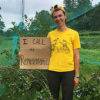Take action for a just and climate-smart food system… even if you aren’t following all the complexities taking place on Capitol Hill! We are tracking opportunities for the Jewish community to tip the scales toward effective policy. Join our advocacy alert list and we’ll call you to action (well, we’ll email you to action) whenever a groundswell of grassroots voices would make a difference. Sign up here to receive Hazon’s Advocacy Alerts! Does calling your legislator and asking them to support, or oppose, an upcoming bill sound intimidating? We’ll make it easy by providing a clear script. You don’t need any prior understanding of what a filibuster is or what political infighting is happening in which relevant subcommittees! Does commenting on a Department of Agriculture rulemaking process sound kind of boring? We’re not going to lie, it is. But with our help, it will take only five minutes or less out of your day! Jewish heroism has never been limited to the story of young David with a loaded slingshot or Judah Maccabee with his shield. Our work on behalf of a just and abundant future has mostly manifested as stories of individuals joining together to collectively do the small, […]









